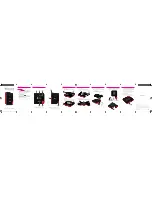
Address Mode
The SureCross wireless devices may use one of two types of addressing modes: rotary dial addressing or extended addressing. In
rotary dial address mode, the left rotary dial establishes the network ID and the right rotary dial sets the device ID. The wireless network
is restricted to a maximum of 16 devices.
Extended address mode uses a security code to "bind" Nodes to a specific Gateway. Bound Nodes can only send and receive informa-
tion from the Gateway to which they are bound. In extended address mode, wireless networks may contain up to 48 radio devices. For
more information on extended address mode, refer to the SureCross
™
Wireless I/O Network product manual.
The device ships in rotary dial address mode by default, with the DIP switch in the OFF position. To use extended address mode, change
the DIP switch to the ON position.
Discrete Input Type
Select the type of discrete input sensors to use with this device: sourcing (PNP) sensors or sinking (NPN) sensors.
Link Loss Outputs
The SureCross DX80 wireless devices use a deterministic radio link time-out method to address RF link interruption or failure. When a
radio link fails, all pertinent wired outputs are sent to defined states until the link is recovered, ensuring that disruptions in the communica-
tions link result in predictable system behavior.
Following a radio link time-out, all outputs linked to the Node in question are set to de-energize (discrete outputs to zero, analog outputs
to 0 mA or 4 mA), energize (discrete outputs to one, analog outputs to 20 mA), or to hold the last stable state/value. Use the DIP switches
to select the link loss output state.
Modbus/User Configuration Tool (UCT) or DIP Switch Configured
In Modbus/UCT Configured mode, the device parameters are changed using the User Configuration Tool (UCT) or a Modbus command.
All DIP switch positions are ignored. In DIP Switch Configured mode, use the DIP switches to configure the parameters listed in the table.
Wiring Your SureCross
®
Device
Use the following wiring diagrams to first wire the sensors and then apply power to the SureCross devices.
5-pin Euro-Style Wiring (Nodes)
Wiring the 5-pin Euro-style connector depends on the model and power requirements of the device. Connecting dc power to the commu-
nication pins will cause permanent damage. For FlexPower devices, do not apply more than 5.5V to the gray wire.
Wire No.
Wire Color
10 to 30V dc Powered Nodes
Battery Powered Nodes
1
2
3
4
5
1
Brown
10 to 30V dc
2
White
3
Blue
dc common (GND)
dc common (GND)
4
Black
5
Gray
3.6 to 5.5V dc
Terminal Block
PWR
GND
DO4
DI4
PWR
GND
DO2
DI2
PWR
GND
DO3
DI3
PWR
GND
DO1
DI1
DIx. Discrete IN x.
DOx. Discrete OUT x.
GND. Ground/dc common connection.
PWR. Power, 10 to 30V dc power connection.
SureCross DX80 Node
P/N 131293 Rev. F
www.bannerengineering.com - tel: 763-544-3164
3

























